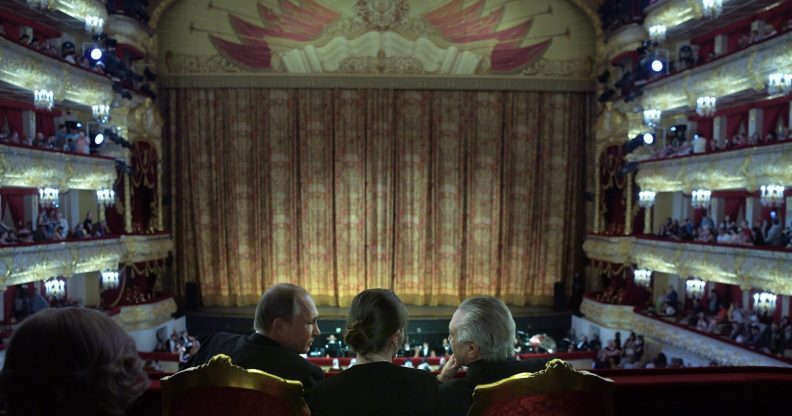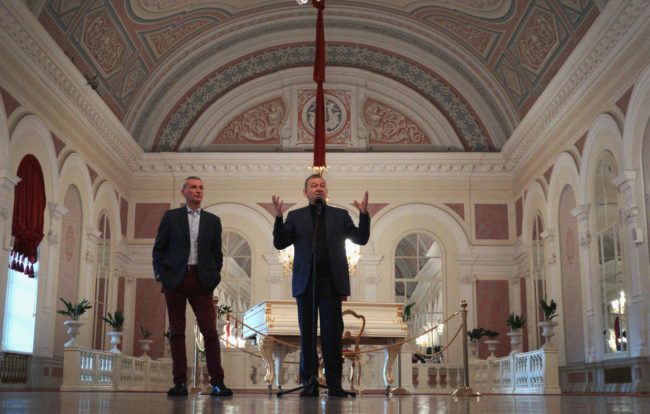Russian ballet allegedly cancelled over ‘gay propaganda’

Russian President Vladimir Putin (L) and Brazil’s President Michel Temer (R) speak as they attend the concert by the winners of the XIII International Ballet Competition and Contest of Choreographers at The Bolshoi Theatre in Moscow on June 20, 2017. / AFP PHOTO / Sputnik / Alexei Druzhinin (Photo credit should read ALEXEI DRUZHININ/AFP/Getty Images)
The premiere of a new ballet at Russia’s Bolshoi theatre was allegedly cancelled over concerns about ‘gay propaganda’.
The Bolshoi theatre shocked the art world by cancelling new ballet Nureyev, days before its world premiere .
One of the most anticipated ballets of the season, Nureyev had been set to make its debut on Tuesday, but all performances were cancelled on short notice over the weekend under mysterious circumstances.
The ballet is based on the life of gay Soviet dancer Rudolf Nureyev, who defected to the West in the 1960s.
The decision to pull the ballet led to allegations that the Russian government had intervened, over concerns about male nudity and gay themes.
Russian outlet Meduza reports that the decision was allegedly taken on the orders of Russian Culture Minister Vladimir Medinsky, citing the depiction of homosexuality.
The minister has denied giving any such order, though he told state news agency TASS: “I fully support this decision. It is balanced and correct.”
The country maintains a controversial 2013 law that bans “propaganda of non-traditional sexual relationships”, which has been seized upon by authorities to clamp down on depictions of gay people in public life.
At a press conference today, Bolshoi general director Vladimir Urin aggressively denied the allegations that the ballet was cancelled over gay propaganda concerns, insisting that the decision was taken for “artistic reasons”.

Director of the Bolshoi Ballet Makhar Vaziev and the Bolshoi theatre general director Vladimir Urin (Photo by ALEXANDER NEMENOV/AFP/Getty Images)
However, the ballet’s director Kirill Serebrennikov has not publicly commented.
In a ruling last month, the European Court of Human Rights condemned Russia’s ‘gay propaganda’ law.
The law also bans people sharing “distorted ideas about the equal social value of traditional and non-traditional sexual relationships”, and has been widely abused in the country to clamp down on the LGBT rights movement as a whole.
In its ruling, the ECHR found the law to be in breach of freedom of expression protections, as well as ruling that it “reinforces stigma and prejudice and encouraged homophobia”.
The Russian Justice ministry has vowed to appeal the ruling.
In a statement, the department said the law was solely designed “to defend morality and children’s health”, and did not impact freedom of expression.
But LGBT activists say the law has had a chilling effect across Russian culture.
Last year, Russian MPs called for football video game FIFA 17 to be banned because it allowed players to take part in the rainbow laces campaign.
A special Pride-themed football kit was made available as a free download for FIFA 17 players across PC, Xbox and Playstation gaming platforms as part of the tie-up.
Russia’s censorship body was urged by lawmakers to open a probe into the potential violation of the ‘gay propaganda’ law.

